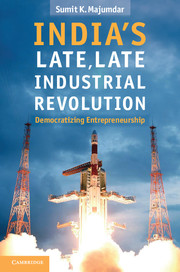Book contents
- Frontmatter
- Contents
- Figures
- Tables
- Acknowledgments
- Preface
- 1 Vent for growth
- 2 Industrial revolutions
- 3 Aspects of Indian enterprise history
- 4 The emergence of modern industry
- 5 Asian late industrialization
- 6 Democratizing entrepreneurship
- 7 Contemporary India
- 8 The services sector debate
- 9 A paean for manufacturing
- 10 Reindustrializing India
- Appendix
- Notes
- Bibliography
- Index
4 - The emergence of modern industry
Published online by Cambridge University Press: 05 June 2012
- Frontmatter
- Contents
- Figures
- Tables
- Acknowledgments
- Preface
- 1 Vent for growth
- 2 Industrial revolutions
- 3 Aspects of Indian enterprise history
- 4 The emergence of modern industry
- 5 Asian late industrialization
- 6 Democratizing entrepreneurship
- 7 Contemporary India
- 8 The services sector debate
- 9 A paean for manufacturing
- 10 Reindustrializing India
- Appendix
- Notes
- Bibliography
- Index
Summary
Entrepreneurship in the nineteenth century
In 1976, in an obscure corner of the Rajabagan dockyard of the Central Inland Water Transport Corporation, in the southern reaches of the Hugli, the river that flows through Calcutta, a huge pile of rusting junk metal was discovered. On closer inspection, it turned out to be a steam engine. It was one of the first steam engines to come to India, and it might even have been the first. It had belonged to the India General Steam Navigation Company. Prior to that, it had belonged to the Calcutta Steam Tug Association. The identity of that scrap metal’s original corporate owners is not important. The identity of the companies’ ultimate owner is. The owner of the companies was Carr, Tagore and Company, a firm founded by Dwarkanath Tagore.
Dwarkanath Tagore, known as the Prince, has gone down in history as the grandfather of two extremely illustrious grandchildren. The older of the two, Satyendranath Tagore, was the first Indian to join the ICS in 1863. A younger grandchild, Rabindranath Tagore, was India’s first Nobel laureate, winning the literature prize in 1913. Dwarkanath Tagore, however, deserves approbation as the father of modern entrepreneurship in India, in the form that we know it. His firm, dating back to the 1820s, Carr, Tagore and Company, was what we today classify as a holding company for a conglomerate of businesses. It had interests in many activities, and particularly in shipping. Dwarkanath Tagore voyaged to Britain in his own ship. Carr, Tagore and Company had also formed the Bengal Tea Association, which was the first Indian enterprise to start tea cultivation.
- Type
- Chapter
- Information
- India's Late, Late Industrial RevolutionDemocratizing Entrepreneurship, pp. 95 - 125Publisher: Cambridge University PressPrint publication year: 2012

